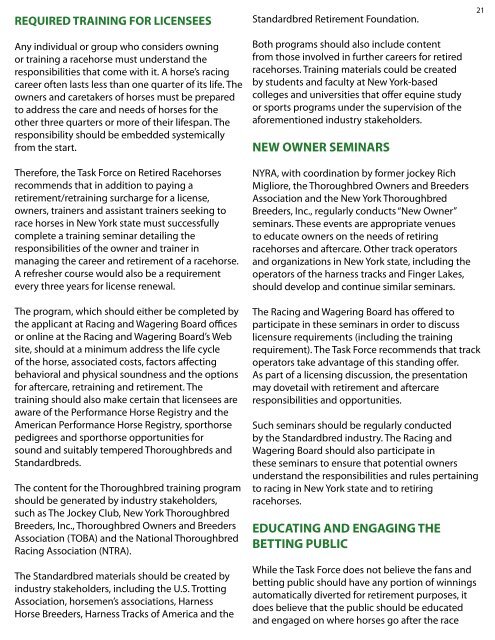Retired Racehorses
tfrr_reportandappendicesfinal
tfrr_reportandappendicesfinal
- No tags were found...
You also want an ePaper? Increase the reach of your titles
YUMPU automatically turns print PDFs into web optimized ePapers that Google loves.
REQUIRED TRAINING FOR LICENSEES<br />
Any individual or group who considers owning<br />
or training a racehorse must understand the<br />
responsibilities that come with it. A horse’s racing<br />
career often lasts less than one quarter of its life. The<br />
owners and caretakers of horses must be prepared<br />
to address the care and needs of horses for the<br />
other three quarters or more of their lifespan. The<br />
responsibility should be embedded systemically<br />
from the start.<br />
Therefore, the Task Force on <strong>Retired</strong> <strong>Racehorses</strong><br />
recommends that in addition to paying a<br />
retirement/retraining surcharge for a license,<br />
owners, trainers and assistant trainers seeking to<br />
race horses in New York state must successfully<br />
complete a training seminar detailing the<br />
responsibilities of the owner and trainer in<br />
managing the career and retirement of a racehorse.<br />
A refresher course would also be a requirement<br />
every three years for license renewal.<br />
Standardbred Retirement Foundation.<br />
Both programs should also include content<br />
from those involved in further careers for retired<br />
racehorses. Training materials could be created<br />
by students and faculty at New York-based<br />
colleges and universities that offer equine study<br />
or sports programs under the supervision of the<br />
aforementioned industry stakeholders.<br />
NEW OWNER SEMINARS<br />
NYRA, with coordination by former jockey Rich<br />
Migliore, the Thoroughbred Owners and Breeders<br />
Association and the New York Thoroughbred<br />
Breeders, Inc., regularly conducts “New Owner”<br />
seminars. These events are appropriate venues<br />
to educate owners on the needs of retiring<br />
racehorses and aftercare. Other track operators<br />
and organizations in New York state, including the<br />
operators of the harness tracks and Finger Lakes,<br />
should develop and continue similar seminars.<br />
21<br />
The program, which should either be completed by<br />
the applicant at Racing and Wagering Board offices<br />
or online at the Racing and Wagering Board’s Web<br />
site, should at a minimum address the life cycle<br />
of the horse, associated costs, factors affecting<br />
behavioral and physical soundness and the options<br />
for aftercare, retraining and retirement. The<br />
training should also make certain that licensees are<br />
aware of the Performance Horse Registry and the<br />
American Performance Horse Registry, sporthorse<br />
pedigrees and sporthorse opportunities for<br />
sound and suitably tempered Thoroughbreds and<br />
Standardbreds.<br />
The content for the Thoroughbred training program<br />
should be generated by industry stakeholders,<br />
such as The Jockey Club, New York Thoroughbred<br />
Breeders, Inc., Thoroughbred Owners and Breeders<br />
Association (TOBA) and the National Thoroughbred<br />
Racing Association (NTRA).<br />
The Standardbred materials should be created by<br />
industry stakeholders, including the U.S. Trotting<br />
Association, horsemen’s associations, Harness<br />
Horse Breeders, Harness Tracks of America and the<br />
The Racing and Wagering Board has offered to<br />
participate in these seminars in order to discuss<br />
licensure requirements (including the training<br />
requirement). The Task Force recommends that track<br />
operators take advantage of this standing offer.<br />
As part of a licensing discussion, the presentation<br />
may dovetail with retirement and aftercare<br />
responsibilities and opportunities.<br />
Such seminars should be regularly conducted<br />
by the Standardbred industry. The Racing and<br />
Wagering Board should also participate in<br />
these seminars to ensure that potential owners<br />
understand the responsibilities and rules pertaining<br />
to racing in New York state and to retiring<br />
racehorses.<br />
EDUCATING AND ENGAGING THE<br />
BETTING PUBLIC<br />
While the Task Force does not believe the fans and<br />
betting public should have any portion of winnings<br />
automatically diverted for retirement purposes, it<br />
does believe that the public should be educated<br />
and engaged on where horses go after the race


